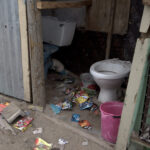The liquor ban may have contributed to nearly a 60% drop in trauma admissions, according to new research seen by Bhekisisa.
President Cyril Ramaphosa has rejected requests by Gauteng business owners to lift the country’s alcohol ban. Instead, the president’s lawyers suggested that eligible businesses apply for financial assistance from the government.
The Gauteng Liquor Forum represents about 20 000 tavern and shebeen owners in the province. In an 11 April letter sent to Ramaphosa, the group threatens to go to court to lift the ban. Instead, they request for the president to resume the restricted trading hours in place before Ramaphosa instituted a national lockdown to curb new cases of the virus.
In a seven-page response, the office of the state attorney says the decision to implement a national lockdown was not taken lightly.
And, that all trade “except truly essential services” was halted in an attempt to maximise the effects of the national lockdown and to prevent the virus from “ravaging” South Africans living in the poorest conditions.
Alcohol is simply not an essential service, they argue, and the liquor industry is not the only sector feeling the pinch.
“In the face of a pandemic such as COVID-19, the experience of the rest of the world has shown us that hospitals need to be prepared to receive and treat vast numbers of COVID-19 patients and to quarantine them from non-infected patients.”
The forum’s lawyers were not immediately reachable for comment.
Is alcohol really that bad?
Alcohol takes a huge toll on the country’s health system, says Charles Parry, who heads up the South African Medical Research Council’s (MRC) unit on alcohol, tobacco and other drugs.
In 2015, about 62 300 deaths among South African adults were linked to alcohol use — the majority among lower-income groups, found a study published in the journal BMC Medicine in 2018. That’s about 171 people per day.
These deaths weren’t only the result of — for instance — drunk driving but also included deaths attributable to diseases such as HIV, TB and heart disease for which drinking can be a risk factor.
Although people from lower income groups were less likely to be drinkers, people in these income brackets carried a higher health burden due to alcohol, the study found. This phenomenon is seen internationally and is in part tied to inequality, explain researchers from the United Kingdom’s Institute for Alcohol Studies.
Parry cautions that because alcohol use can weaken the immune system, it may put heavy drinkers at a higher risk of contracting the new coronavirus and, if they do, developing serious COVID-19 symptoms.
Heavy drinkers, for instance, are more likely to develop not only tuberculosis but also other respiratory diseases. When they do fall sick with these illnesses, people who drink may experience worse symptoms, warn researchers in a 2015 paper in the journal Alcohol Research: Current Reviews.
Although less than half of South Africans drink, up to one in two who do, do so heavily, shows the country’s most recent Demographic and Health Survey and 2018 data from the World Health Organisation.
Parry says: “We are not a nation of moderate drinkers. Once we start, many drinkers don’t stop until they are intoxicated.”
New research shows the alcohol ban has worked so far
In February, before the lockdown, South Africa saw about 35 000 weekly admissions to hospital trauma units around the country.
But since lockdown started, two-thirds of those admissions disappeared — including 9 000 of which would have been alcohol-related admissions, according to an unpublished modelling study. The research was prepared by Parry and his MRC colleague Richard Matzopoulos as well as University of Cape Town head of trauma services Andrew Nicol.
The mathematical model is based, in part, on data gathered from trauma units at Chris Hani Baragwanath Hospital in Johannesburg and Cape Town’s Groote Schuur Hospital. The model also assumes, for example, that restrictions on movement continue, leading to fewer cars and people on the road and that places such as bars and shebeens remain shut. It also factors in increased risk of violence to women and children as alcohol bought in stores is consumed at home.
Should the alcohol ban be lifted, the study shows, hospitals will likely see some of those trauma cases return.
The researchers write: “We estimate that just under 5 000 alcohol-related admissions to trauma units will reappear in a given week if alcohol sales are permitted during lockdown.”
In other words, just over half of the 9 000 alcohol-related admissions that have disappeared since lockdown began on 26 March, will return, pushing up the number of admissions to hospital each week to between 12 000 and 13 000.
And Parry says that alcohol might increase the risk that people begin mingling, increasing the likelihood that the coronavirus spreads.
This is exactly what the liquor ban was put in place to prevent, the president’s lawyers write in its response to the Forum.
“Prohibiting the sale of alcohol is also aimed at ensuring compliance with the Lockdown Regulations, social distancing protocols and proper hygiene practices by reducing or eliminating the number of intoxicated persons.”
“Shebeens and taverns are places of socialisation,” says public health lawyer Safura Abdool Karim. She’s also a senior researcher at the University of the Witwatersrand’s Centre for Health Economics and Decision Science, called Priceless.
“People don’t just grab a drink and go home. They socialise with each other and may spend prolonged amounts of time with their judgement impaired.”
“Allowing specifically shebeens and taverns to operate would severely undermine the lockdown.”
Joan van Dyk was a health journalist, senior health journalist and news editor at Bhekisisa between 2017 and 2023.




